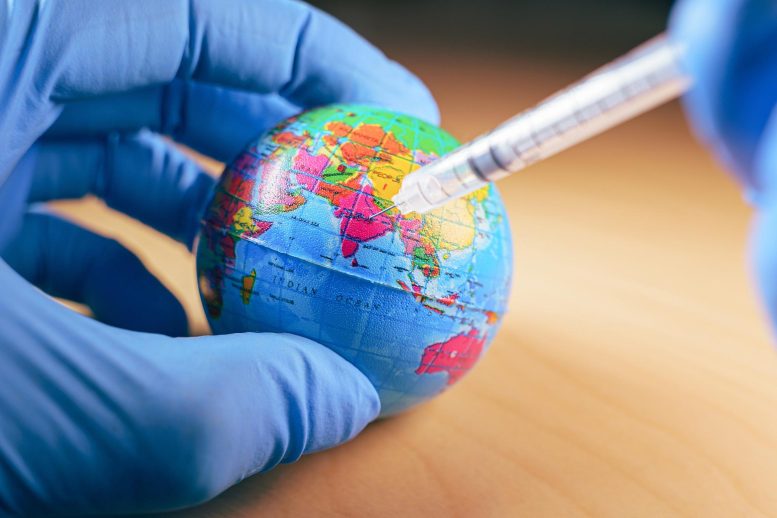
By providing multinational data on COVID-19 vaccine acceptance over three years, this new study can help policymakers address vaccine hesitancy more effectively.
Acceptance of COVID-19 vaccines increased globally, from 75.2% in 2021 to 79.1% in 2022, according to a survey in 23 countries that represent more than 60% of the world’s population. However, vaccine acceptance decreased in eight countries and almost one in eight vaccinated respondents, particularly younger men and women, were hesitant about receiving a booster dose. Led by the Barcelona Institute for Global Health (ISGlobal) and the CUNY Graduate School of Public Health and Health Policy (CUNY SPH) and published on January 9 in the journal Nature Medicine, the study underlines a wide variability among countries and the need for tailored communication strategies in addressing vaccine hesitancy.
“The pandemic is not over, and authorities must urgently address vaccine hesitancy and resistance as part of their COVID-19 prevention and mitigation strategy,” says Jeffrey V Lazarus, Head of the Health Systems Research Group at ISGlobal, an institution supported by “la Caixa” Foundation. To do so effectively, though, policy-makers need solid data on vaccine hesitancy trends (whether it is decreasing or increasing and in which populations) and drivers (factors that influence vaccine acceptance, such as income or education).
To obtain these data, an international collaboration led by Lazarus and Ayman El-Mohandes, Dean of CUNY SPH, performed a series of surveys starting in 2020 across 23 highly populated countries that were hit hard by the pandemic (Brazil, Canada, China, Ecuador, France, Germany, Ghana, India, Italy, Kenya, Mexico, Nigeria, Peru, Poland, Russia, Singapore, South Africa, South Korea, Spain, Sweden, Turkey, the United Kingdom and the United States). The data reported here correspond to the third survey conducted between June and July 2022.
Of the 23,000 respondents (1000 per country surveyed), 79.1% were willing to accept vaccination. This finding represented an increase of 5.2% from June 2021. The willingness of parents to vaccinate their children also rose slightly, from 67.6% in 2021 to 69.5% in 2022. However, eight countries observed increased hesitancy (from 1.0% in the UK to 21.1% in South Africa). Worryingly, almost one in eight (12.1%) vaccinated respondents were hesitant about booster doses. This hesitancy was higher among the younger age groups (18-29). “We must remain vigilant in tracking these data, containing COVID-19 variants and addressing hesitancy, which may challenge future routine COVID-19 immunization programs,” says Ayman El-Mohandes, senior author.
The survey also provides new information on COVID-19 treatments received. Globally, ivermectin was taken with the same frequency as other approved medications, even though the WHO and other agencies do not recommend its use to prevent or treat COVID-19.
Also, almost 40% of respondents reported paying less attention to new COVID-19 information than before and having less support for vaccine mandates.
The Diverse Nature of Vaccine Hesitancy
In some countries, vaccine hesitancy was associated with variables like female sex (e.g., China, Poland and Russia), no university degree (e.g., France, Poland, South Africa, Sweden and the US), or lower income (e.g., Canada, Germany, Turkey and the UK). Further, the profile of people paying less attention to the pandemic varied among countries.
“Our results show that public health strategies to enhance booster coverage will need to be more sophisticated and adaptable for each setting and target population,” says Lazarus. “Strategies to enhance vaccine acceptance should both include messages that emphasize compassion over fear and use trusted messengers, particularly healthcare workers,” he adds.
Overall, the data provided in the surveys can prove useful for health system decision-makers, practitioners, advocates and researchers to address COVID-19 vaccine hesitancy more effectively. The new study follows on the heels of a global consensus statement on ending COVID-19 as a public health threat, which Lazarus, El-Mohandes and 364 co-authors from 112 countries published in Nature three months ago.
References:
“A survey of COVID-19 vaccine acceptance across 23 countries in 2022” by Jeffrey V. Lazarus, Katarzyna Wyka, Trenton M. White, Camila A. Picchio, Lawrence O. Gostin, Heidi J. Larson, Kenneth Rabin, Scott C. Ratzan, Adeeba Kamarulzaman and Ayman El-Mohandes, 9 January 2023, Nature Medicine.
DOI: 10.1038/s41591-022-02185-4
“Revisiting COVID-19 vaccine hesitancy around the world using data from 23 countries in 2021” by Jeffrey V. Lazarus, Katarzyna Wyka, Trenton M. White, Camila A. Picchio, Kenneth Rabin, Scott C. Ratzan, Jeanna Parsons Leigh, Jia Hu and Ayman El-Mohandes, 1 July 2022, Nature Communications.
DOI: 10.1038/s41467-022-31441-x
Never miss a breakthrough: Join the SciTechDaily newsletter.